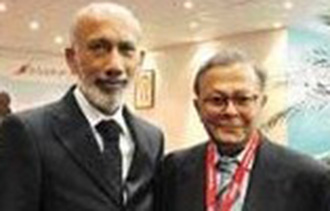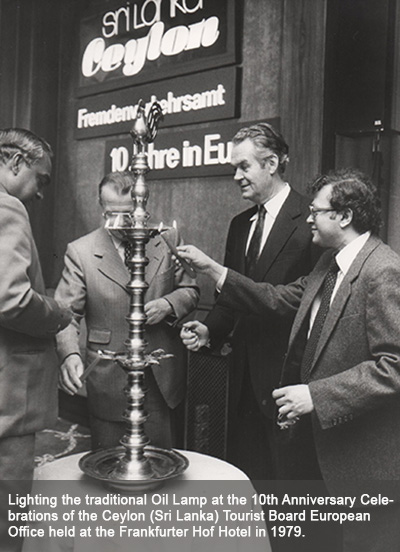Consulate General of Sri Lanka
Frankfurt, Germany
| Success Story |  |
|
| Sam Samaradivakara pioneer in Sri Lanka tourism |
Sri Lanka’s tourism which started from mid 50’s as a day stopover Port-of-call day for Cruises shuttling between UK and Australia was given a turbo-boost in 1966 by the Mr.J.R.Jayewardene, Minister of State in charge of Tourism, under the new government’s open market policy, when he established the Ceylon Tourist Board (CTB) to develop Tourism as a major state economic pillar on a planned basis.
Mr. Sam Samaradivakara who began his Tourism career as Publicity Officer of the former Government Tourist Buro (GTB) in 1962 was appointed as Asst. Director Publicity of the Ceylon Tourist Board (CTB) where he established departments to handle Publicity & PR, Media, Information and Distribution in 1966. Later he was promoted as Actg. Director Publicity.
In 1972 he went to Japan on Colombo Plan Award on Tourism training program at the end of which within 5 days he conducted 17 Workshops (16 in Tokyo and one in Osaka) for the Japan Travel Trade Wholesalers, and made the first break through in developing tourist traffic from Japan to Sri Lanka..
While in Colombo with no plans of ever coming to Germany, Mr.Samaradivakara enrolled at the Goethe Institute in Colombo to learn German but spent more time listening to Bach and Beethoven classical music in the library and missing classes...
At the end 1972 the Tourist Board appointed Mr.Samaradivakara as Director/Europe, Ceylon Tourist Board Office, Frankfurt am Main to succeed Director Mr. Mano Handy, who had set up the Frankfurt Office in 1969 and was leaving to take up an international assignment.
 On landing in Frankfurt, he took leave from office and enrolled at the Goethe Institute in Boppard to brush up his German. His daughter Lalanthi who was by then attending a German primary school was his teacher on the weekends. He overcame his tongue twisting name with a short cut ‘Sam’ under which he’s known among the travel trade. His acquaintance with the German culture and attitudes helped him to integrate himself to the new environment. On landing in Frankfurt, he took leave from office and enrolled at the Goethe Institute in Boppard to brush up his German. His daughter Lalanthi who was by then attending a German primary school was his teacher on the weekends. He overcame his tongue twisting name with a short cut ‘Sam’ under which he’s known among the travel trade. His acquaintance with the German culture and attitudes helped him to integrate himself to the new environment.His first task was to find ways and means of either beating or to join the major league players - Thailand, Kenya and the Caribbean - which were the longhaul market leaders in Germany.
To maximize the limited budget resources Mr. Samaradivakara segmented Western Europe into three categories: Germany, UK, France, Switzerland and Scandinavia as Prime Markets, and rest as Secondary and Opportunity Markets.
In 1972 tourist arrivals from Germany and Europe reached around 8500 arrivals. At the end of 1973, tourist arrivals from Germany reached 10.286, while arrivals from Western Europe totaled 50.704 accounting for two thirds of the total.
In order to push growth, he concentrated supporting and with the major Tour Operators and Wholesalers and conducting Travel Agency staff education through Travel Seminars.
He also availed of national and international Travel Organisations such as PATA(Pacific Area Travel Association) and DRV (German Travel Agents’ Association) both in Germany and as well as in other Prime Markets.
As Chairman of the German Chapter in Frankfurt he had the support of the German elite travel trade
As Sri Lanka was handicapped through lack of scheduled flight connections. Mr. Samaradivakara who had played a pioneering role in developing the first Charter flight from Switzerland with Hotelplan in 1964, forged close partnership with Charter Carriers such as Condor and LTU in Germany, Balair in Switzerland, Vingresor in Sweden and Tjaereborg in Denmark.
German charter carriers which used Colombo and Bangkok as twin centres were persuaded to launch back to back flights to Colombo to eliminate hassle of the 18 hour round flight via Bangkok for tourists visiting Sri Lanka. The demand for back to back flights saw Charter carriers changing aircrafts from 707’s to 747 Jumbos.
Launching into bidding for International Travel Conference to be held for high profile visibility as well as a tourist generator, in 1974 at the UFTAA (Universal Federation of Travel Agents’ Associations) World Congress, Istanbul, Turkey, he won the bid for UFTAA World Congress in Sri Lanka in 1976.
The bid was not without problems. Planning to take 700 half Ceylon Tea Board packets of Ceylon Tea for distribution to delegates he asked for help from Turkish organisers, who said that Ceylon Tea was banned in Turkey and I should bring it in suitcases and they would clear it at the Customs. As it would require a plane load of suitcases Mr.Samaradivakara had it sent as freight.
Turkey Customs refused the clearance of tea and after days and shuttling between the Conference Centre and intervention at a high level by the Turkish organisers to the government in Ankara, the tea was released to distribute at the last 11th hour by which time Sri Lanka had won the bid and delegates including the Tourist Board Director General, Mr.M.Y.M.Thair and Mr. Cyril Lawrence were overjoyed.
In 1980 at the PATA Conference and Trade Exhibition, Los Angeles, he organised and won the bid for PATA Annual Conference 1984 in Combo
Same year at the ICCA (International Convention and Conference Association) Congress, Vienna, Austria he organised and won the bid for ICCA Congress 1983 in Sri Lanka, beating competing from India and Kenya, but not before running into problems.
The ICCA Executive said the bid must from a Sri Lanka government organization on an official letterhead guaranteeing all delegates will be allowed entry (including Taiwan and South Africa) and I could use my official paper.
He telephoned his Office and asked a staff member to bring few letterheads to Vienna. While Sri Lanka delegates, including Mr. Mark Bostock and Mr. Ken Balendra were holding fort at the Congress dinner Mr. Samaradivakara who was awaiting at the Vienna Airport to collect the letterheads had to return empty handed as the Lufthansa flight could not land due heavy fog.
He then asked his colleagues to get our Freight Agent to courier the packet fastest possible and it arrived an hour before the voting and having typed the invitation it was sent to the Chair. At the voting on the Congress venue the Chair announced that he had three invitations from India, Kenya and Sri Lanka.
At the Congress in Salt Lake City USA, in 1981 Sri Lanka won the bid over Kenya.
In 1983 at the PATA Annual Conference, Acapulco, Mexico Mr. Samaradivakara organised Sri Lanka GALA Evening for 2000 invitees to promote PATA Annual Conference 1984 in Sri Lanka & attended by a large Sri Lanka delegate
1983 he officiated as Chairman, PATA Board Directors’ Meeting, Amsterdam, Netherlands, as proxy for CTB Chairman as Chairman PATA Board and helped to stop the shifting PATA Conference away from Sri Lanka by offering to subside any short fall in the number of delegates targeted to attend.
By late 1970’s Sri Lanka gained its place as one of the four major longhaul destinations together with Thailand, Kenya and the Caribbean.
Realising that his credibility and effectiveness would be judged by Travel Trade leaders if only he was a decision maker, fortunately, he was able to enjoy the confidence of the Ministry of Tourism and the Colombo Head Office in decision making within given budget commitments and reverting to Head Office only on policy matters.
To meet the travel trade demands Mr. Samaradivakara expanded the organisation by opening CTB Offices in Scandinavia in 1978, and Offices in Paris and Milan in 1982 in addition to Frankfurt European Office and London Representative Office.
In 1980 he was promoted as Deputy Director General Europe and given additional responsibility as Deputy Director General for North America for two years.
The net result was the increase in from 1973 to 1981 with 245190 arrivals from Western Europe (accounting for 65% of total) and 85.546 arrivals from Germany as market leader, followed by France with 37.618 and U.K. with 36.393.
The downturn started before the ethnic riots of July 1983 when Mr. Samaradivakara was asked by telex of 16 June 1983 asking for plans to launch measures to increase tourists from Europe to offset the loss as a result of restrictions imposed by the Indian government on Indians travelling to Sri Lanka
When the ethnic riots flared at the end of July 1983 tourism to Sri Lanka came to a dead halt just when the major Tour Operators had launched the Winter 83/84 Tour Catalogues giving Sri Lanka increased coverage.
Mr. Samaradivakara, assessing the market collapse with no bookings coming in and threats to cancel the Winter operations by the Tour operators, warned Head Office of measures required urgently as counter measures the tourism authorities living in a fancy world advised him in return11. August 83 informing of decisions taken at a meeting of ground operators, airlines, resident representatives to restore the image, which included issuing a message from the Minister, inviting decision makers to visit Sri Lanka, arrange welcome reception for first group tourist arriving on each carrier, overseas offices ‘to arrange media to interview returning tourists and give publicity to their impressions’ etc.
Finally when Mr. Samaradivakara informed Tourist Board that the Swiss Charter Carrier Balair had decided to cancel Winter 83/84 flights leaving shutting out the Swiss tourist traffic, the Board asked him to Colombo with a Plan to resuscitate tourism.
His proposal to launch a Crash Program to be executed between October to November 1983 on a budget of 1.5 US Dollars was supported Secretary Ministry of State, Mr.Douglas Liyange who requested the Secretary Ministry of Finance to grant finances required to prevent grave social and political repercussions that could follow from the loss of local employment.
The main element of the Crash Program in Germany was a confidence building advertising campaign which was conducted through Ogilvy Mather Focus, which won Gold Award at the ITB Berlin in 1984, which was the first time it had been won by a developing country.
Mr. Samaradivakara came to Germany in 1972 on a 3 year assignment and his track record of developing tourism at an annual growth of 20% ensured that the Tourist Board wanted his continuity until retirement in 1986.
The platform he left behind for successors has been gradually disintegrated finally leading to the closure of the flagship European Office.
|







